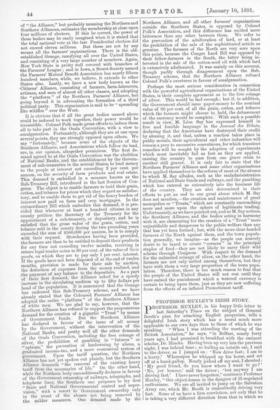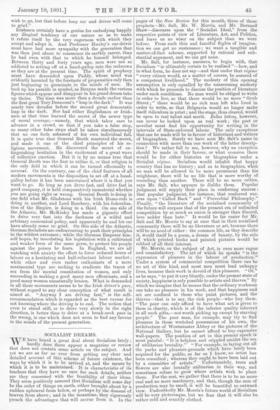PROFESSOR HUXLEY'S IRISH STORY.
PROFESSOR HUXLEY, in his happy little letter to last Saturday's Times on the subject of General Booth's plan for attacking English pauperism, tells a delightful Irish story which has a moral much more applicable to our own days than to those of which he was speaking. " When I was attending the meeting of the British Association," he says, " in Belfast, nearly forty years ago, I had promised to breakfast with the eminent scholar, Dr. Hincks. Having been up very late the previous night, I was behind time ; so hailing an outside car, I said j to the driver, as I jumped on : ' Now drive fast ; I am in a hurry.' Whereupon he whipped up his horse, and set off at a hand-gallop. Nearly jerked off my seat, I shouted : ' My good friend, do you know where I want to go ? ' ' No, yer honour,' said the driver ; ' but anyway I am driving fast.' I have never forgotten," continues Professor Huxley, " this object-lesson in the dangers of ill-regulated enthusiasm. We are all invited tojump on the Salvation Army car, which Mr. Booth is undoubtedly driving very fast. Some of us have a firm conviction, not only that he is taking a very different direction from that in which we wish to go, but that before Iong car and driver will come to grief."
Irishmen certainly have a genius for embodying happily any illogical tendency of our nature so as to make it refute itself by the very eagerness with which they accept and adopt it. And Professor Huxley's car-driver must have had more sympathy with the generation that was then just about to commence its earthly career, than he had even with that to which he himself belonged. Between thirty and forty years ago, men were not so addicted to setting off at a hand-gallop into the unknown as they are at the present time. The spirit of prophecy must have descended upon Paddy, whose mind was evidently haunted by the foretaste of propensities only then just beginning to germinate in the minds of men. He took up his parable in symbol, as Bunyan made the various figures which appear and disappear in his grand dream take up theirs. The time was more than a decade earlier than the first great Tory Democrat's " leap in the dark." It was nearly two decades before the second great democratic leap in the dark. Nor had either Englishmen or Irish- men at that time learned the secret of the newer type of moral courage,—namely, that which takes care to advance in a crowd, so that if you take a false step, so many other false steps shall be taken simultaneously that no one feels ashamed of his own individual fall. It is quite true that General Booth mastered the secret, and made it one of the chief principles of his re- ligious movement. He discovered the secret of ex- tinguishing hesitation in the excitement of a great wave of collective emotion. But it is by no means true that General Booth was the first to utilise it, or that religion is the only field in which it can be turned effectually to account. On the contrary, one of the chief features of all modern movements is the disposition to set off at a hand- gallop before it has been ascertained where it is that you want to go. So long as you drive fast, and drive fast in good company, it is held comparatively immaterial whether you are going right or wrong. General Booth is doing in one field what Mr. Gladstone with his Irish Home-rule is doing in another, and Lord Rosebery, with his federalisa- tion of the Empire, is doing in a third. On one side of the Atlantic, Mr. McKinley has made a gigantic effort to drive very fast into the darkness of a wilful and arbitrary economical policy, and apparently he and his car have already come to grief. On this side of the Atlantic, German Socialists are endeavouring to push their principles to the wildest extremes ; while the German Emperor him- self hopes, by inoculating his legislation with a cultivated and weaker form of the same germ, to protect his people against the poison he fears. In England, we are all watching with anxiety the effort to force reduced hours of labour on a hesitating and half-reluctant labour market ; while other and even rasher enthusiasts of a more sentimental type are seeking to eradicate the traces of sex from the mental constitution of women, and only succeeding in making a good many men effeminate, and a good many women unnaturally brazen. What is demanded in all these movements seems to be the Irish driver's pace, without regard to any clear, conception of what result is aimed at.. " Anyway I am driving fast," is the self- recommendation which is regarded as the best excuse for not knowing where the driving is to end. The notion that even to stand still, or to drive very slowly in the right direction, is better than to drive at a break-neck pace in the wrong, is one which does not seem to find any favour in the minds of the present generation.

































 Previous page
Previous page